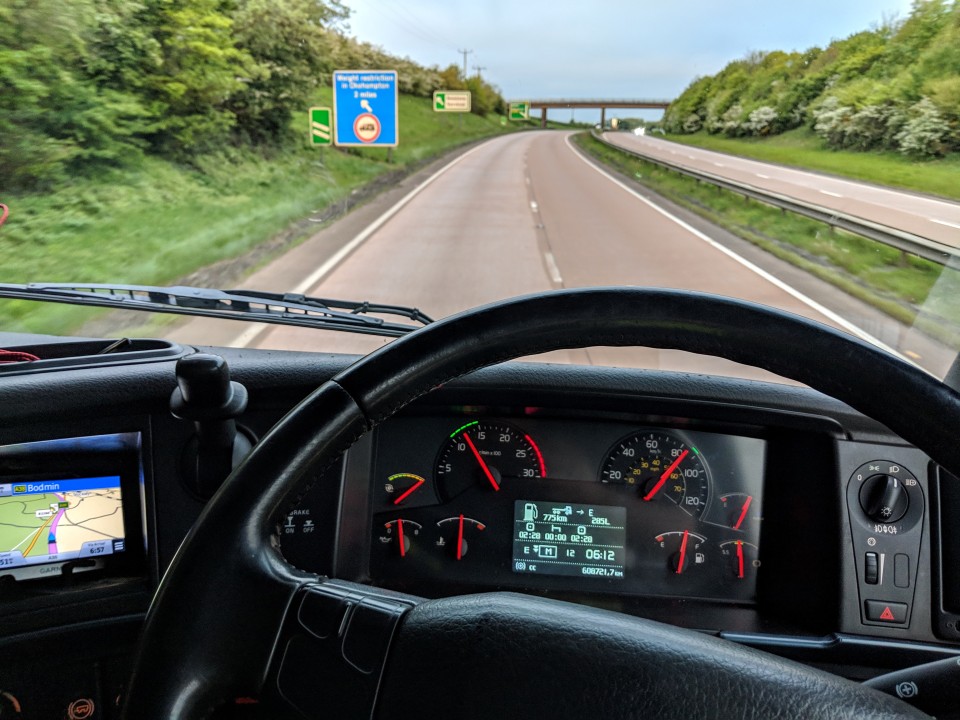
Susie Jones
Ako byť zdravým vodičom nákladného vozidla
Vytvorené: 27. 08. 2024
•
Aktualizované: 27. 08. 2024
Náročné povolanie vodiča nákladného vozidla často zahŕňa dlhé hodiny, sedavý spôsob života a dlhší čas mimo domova, čo sa môže často odraziť na zdraví mnohých vodičov.
Nezdravé návyky, ako je konzumácia rýchleho občerstvenia, nedostatok fyzickej aktivity a poruchy spánku, môžu viesť k možným zdravotným komplikáciám v budúcnosti. Ako si však ako vodič nákladného vozidla udržíte dobrú kondíciu? Ľahšie sa to povie, ako urobí, ale zostavili sme zoznam tipov, ktoré vám pomôžu udržať sa na cestách v čo najlepšej kondícii.
Šesť najlepších tipov, ako si udržať zdravie na cestách
1.Hydratácia
Jednoduchý tip a komodita, ktorú často považujeme za samozrejmosť, avšak väčšina zdravotných problémov vzniká v dôsledku dehydratácie. Pravidelné dúšky vody alebo squashu počas dňa vylúčia z vášho organizmu metabolický odpad a toxíny a udržia vás energickejších a čulých. Ak budete mať pri sebe plniteľnú fľašu s vodou, nielenže vám to pripomenie, aby ste zostali hydratovaní, ale je to aj lepšie pre životné prostredie.
2.Strava
Pokušenie rýchleho občerstvenia po dlhom dni je niečo, s čím sa všetci môžeme stotožniť, avšak rovnako ako udržiavanie hydratácie, aj strava zohráva významnú úlohu pre vaše zdravie, ako aj pre to, ako sa budete cítiť počas celého dňa.
Odporúča sa, aby vodiči nákladných vozidiel jedli tri až štyrikrát denne, a to buď dve jedlá a dve desiaty, alebo dve jedlá a jednu desiatu. Snažte sa dodržiavať plán jedál a občerstvenia s vysokým obsahom omega-3, železa a vitamínu C, napríklad zelenej listovej zeleniny, rýb a ovocia. Vyhnite sa častej konzumácii jedál a nápojov, ako sú cestoviny, chlieb, sladké nápoje a povzbudzujúce látky, napríklad káva a energetické nápoje.
Pozrite si náš zoznam zdravého občerstvenia, ktoré môžete mať v kabíne:
Granolové tyčinky
Energetické tyčinky
Popcorn
Oriešky
Sušené ovocie
Horká čokoláda
Okrem nákupu zdravých potravín na cestách môže byť niekedy zdravšie a cenovo výhodnejšie pripraviť si jedlo. Na stránke Frieghtech nájdete fantastický výber receptov, ktoré vám pomôžu dodržiavať zdravú stravu na cestách.
3.Spánok
Dostatok spánku môže byť pre vodiča nákladného vozidla vzhľadom na charakter práce náročný a môže mať katastrofálne následky pre všetkých na ceste.
Jednoduché tipy a triky, ako napríklad nasledujúce, vám môžu pomôcť s poriadnym spánkom:
Vytvorte v kabíne prostredie, v ktorom sa budete cítiť ako doma. Pozrite si náš príspevok o tom, ako vytvoriť z kabíny nákladného vozidla domov
Udržujte priestor na spanie v tme
Horúca sprcha: Použite našu stránku mapy a zistite, ktoré zastávky pre kamióny ponúkajú túto možnosť
Vyskúšajte niektoré aplikácie, ktoré vám pomôžu so spánkom
Nájdite si ideálne miesto na parkovanie, ktoré bude málo hlučné a nebude vás rušiť. Naša aplikácia intruck poskytuje 5 000 miest pre ťažké nákladné vozidlá v celej Európe, z ktorých si môžete vybrať, zatiaľ čo náš tím SNAP Access and Security vám môže poskytnúť bezpečnostné riešenia na mieru, ktoré vám umožnia lepšie spať s vedomím, že vy a vaše nákladné vozidlo ste v bezpečí.
4.Cvičenie
Jeden z najťažších tipov, ktorý je potrebné dodržiavať na cestách, ale napriek tomu je dôležitý. Dlhé hodiny sedenia počas dňa môžu viesť k zlému držaniu tela, bolestiam chrbta a potenciálnym zdravotným komplikáciám. Po dlhom dni za volantom môže byť lákavé sedieť a relaxovať, avšak rýchla 15-minútová aktivita, ako napríklad chôdza alebo strečing, vám môže priniesť pocit omladnutia a menšieho stresu.
HMD Trucking obsahuje niekoľko užitočných cvičení prispôsobených pre vodičov nákladných vozidiel, ak chcete do svojej rutiny zaradiť niekoľko druhov fyzického cvičenia.
5.Vitamíny
Keď ste na cestách na plný úväzok, môže byť ťažké získať všetky potrebné vitamíny. Každodenné užívanie multivitamínov môže posilniť váš imunitný systém a pomôcť vám udržať si zdravie.
6.Duševné zdravie
Vieme, že starostlivosť o fyzické zdravie na cestách je dôležitá, ale koľko času venujú vodiči nákladných vozidiel starostlivosti o svoje duševné zdravie?

Charitatívna organizácia Mind, ktorá sa zaoberá duševným zdravím, zverejnila štatistiky, z ktorých vyplýva, že 30 % chorôb súvisiacich s prácou v odvetví dopravy a logistiky je spôsobených úzkosťou, osamelosťou, stresom a depresiou. Naznačili tiež, že toto číslo môže byť vyššie, pretože väčšina ľudí nevyhľadá potrebnú pomoc. Okrem toho 95 % práceneschopných ľudí neuvedie skutočný dôvod svojej neprítomnosti v práci, ak sa týka ich duševného zdravia.
Dodržiavanie uvedených tipov a trikov môže mať pozitívny vplyv na vaše duševné zdravie. Okrem toho je dôležité viesť otvorené a úprimné rozhovory s ostatnými vodičmi nákladných vozidiel, nadriadenými alebo dispečermi.
Môže z vás cvičenie urobiť lepšieho vodiča?
Zdravý životný štýl vedie nielen k lepšiemu duševnému zdraviu, ale podľa dôkazov sa vďaka nemu môžete stať aj lepším vodičom. Štúdia ukázala, že vodiči, ktorí boli požiadaní, aby denne cvičili, uvádzali väčšiu ľahkosť pri otáčaní hlavy, boli schopní ďalej otáčať svoje telo a dokázali rýchlejšie nasadnúť do auta.
Čo je najťažšie na práci vodiča nákladného auta?
Dlhé hodiny sa zdajú byť jedným z najťažších aspektov práce vodiča nákladného auta. Vodiči nákladných vozidiel sa často stretávajú s dlhými kilometrami, ktoré musia prekonať, a s antisociálnymi hodinami. Tieto dlhé kilometre a nespoločenské hodiny môžu viesť k nezdravému životnému štýlu.

Ako nezdravé je byť vodičom nákladného auta?
Vzhľadom na životný štýl mnohých vodičov nákladných vozidiel je v priemere štatisticky pravdepodobnejšie, že budú mať zdravotné problémy v porovnaní s ľuďmi v iných povolaniach. Vodiči nákladných vozidiel často čelia niekoľkým prekážkam, ako sú stiesnené pracovné priestory, stresové situácie, neobvyklý spánkový režim a nedostatok výživných potravín, ktoré majú vplyv na ich zdravie.
Udržiavanie zdravého životného štýlu vodiča nákladného vozidla si vyžaduje vedomé úsilie, ale jeho prínosy za to stoja. Vyššie uvedené tipy vám umožnia prevziať kontrolu nad svojím zdravím a zlepšiť svoju pohodu. Sledujte ďalšie tipy a triky od nás zo spoločnosti SNAP.



